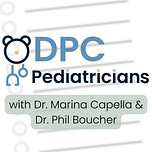In this episode, Dr. Phil Boucher and Dr. Marina Capella tackle a common concern among pediatricians considering a transition to Direct Pediatric Care (DPC): the fear of being on call 24/7. They share insights on how to manage after-hours patient communications effectively without compromising personal time or sleep. The doctors discuss practical strategies for setting boundaries and automating responses to ensure both prompt patient care and personal well-being.
Key Highlights
Introduction to the concerns about 24/7 availability in DPC and how it impacts work-life balance.
Dr. Phil explains the systems and boundaries he has set up to manage patient expectations and after-hours communication.
Discussion on how automated messages and scheduling tools can help manage patient interactions outside of normal office hours.
Strategies for handling urgent late-night inquiries without disrupting the physician’s personal life, including how to use technology to triage patient needs effectively.
Dr. Marina shares her approach to ensuring that her sleep and personal time are respected, while still providing high-quality care to her patients.
Both doctors discuss the benefits of DPC in reducing the volume of after-hours emergencies, thanks to more accessible and personalized care during the day.
More questions or want more help?
Learn more at www.dpcpediatrician.com
Understanding how to manage patient expectations and communications in a DPC model can significantly alleviate the stress of being on call. By setting clear boundaries and utilizing technology, DPC pediatricians can provide excellent care without sacrificing their well-being. Tune in for more episodes where we dive into the practical aspects of running a successful and balanced DPC practice.
Share this podcast with your colleagues who might be considering a leap into DPC or anyone passionate about innovative healthcare solutions.













Share this post